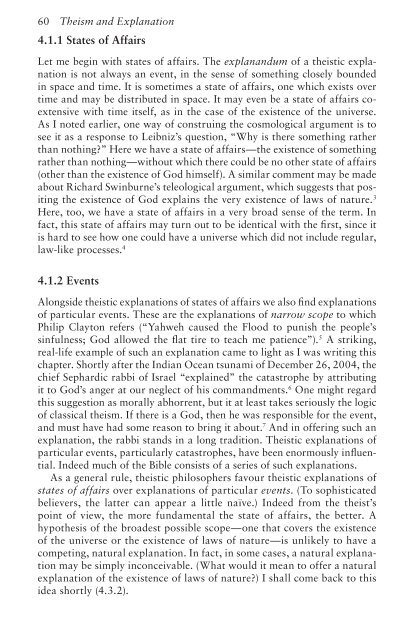Theism and Explanation - Appeared-to-Blogly
Theism and Explanation - Appeared-to-Blogly
Theism and Explanation - Appeared-to-Blogly
You also want an ePaper? Increase the reach of your titles
YUMPU automatically turns print PDFs into web optimized ePapers that Google loves.
60 <strong>Theism</strong> <strong>and</strong> <strong>Explanation</strong><br />
4.1.1 States of Affairs<br />
Let me begin with states of affairs. The explan<strong>and</strong>um of a theistic explanation<br />
is not always an event, in the sense of something closely bounded<br />
in space <strong>and</strong> time. It is sometimes a state of affairs, one which exists over<br />
time <strong>and</strong> may be distributed in space. It may even be a state of affairs coextensive<br />
with time itself, as in the case of the existence of the universe.<br />
As I noted earlier, one way of construing the cosmological argument is <strong>to</strong><br />
see it as a response <strong>to</strong> Leibniz’s question, “Why is there something rather<br />
than nothing?” Here we have a state of affairs—the existence of something<br />
rather than nothing—without which there could be no other state of affairs<br />
(other than the existence of God himself). A similar comment may be made<br />
about Richard Swinburne’s teleological argument, which suggests that positing<br />
the existence of God explains the very existence of laws of nature. 3<br />
Here, <strong>to</strong>o, we have a state of affairs in a very broad sense of the term. In<br />
fact, this state of affairs may turn out <strong>to</strong> be identical with the fi rst, since it<br />
is hard <strong>to</strong> see how one could have a universe which did not include regular,<br />
law-like processes. 4<br />
4.1.2 Events<br />
Alongside theistic explanations of states of affairs we also fi nd explanations<br />
of particular events. These are the explanations of narrow scope <strong>to</strong> which<br />
Philip Clay<strong>to</strong>n refers (“Yahweh caused the Flood <strong>to</strong> punish the people’s<br />
sinfulness; God allowed the fl at tire <strong>to</strong> teach me patience”). 5 A striking,<br />
real-life example of such an explanation came <strong>to</strong> light as I was writing this<br />
chapter. Shortly after the Indian Ocean tsunami of December 26, 2004, the<br />
chief Sephardic rabbi of Israel “explained” the catastrophe by attributing<br />
it <strong>to</strong> God’s anger at our neglect of his comm<strong>and</strong>ments. 6 One might regard<br />
this suggestion as morally abhorrent, but it at least takes seriously the logic<br />
of classical theism. If there is a God, then he was responsible for the event,<br />
<strong>and</strong> must have had some reason <strong>to</strong> bring it about. 7 And in offering such an<br />
explanation, the rabbi st<strong>and</strong>s in a long tradition. Theistic explanations of<br />
particular events, particularly catastrophes, have been enormously infl uential.<br />
Indeed much of the Bible consists of a series of such explanations.<br />
As a general rule, theistic philosophers favour theistic explanations of<br />
states of affairs over explanations of particular events. (To sophisticated<br />
believers, the latter can appear a little naïve.) Indeed from the theist’s<br />
point of view, the more fundamental the state of affairs, the better. A<br />
hypothesis of the broadest possible scope—one that covers the existence<br />
of the universe or the existence of laws of nature—is unlikely <strong>to</strong> have a<br />
competing, natural explanation. In fact, in some cases, a natural explanation<br />
may be simply inconceivable. (What would it mean <strong>to</strong> offer a natural<br />
explanation of the existence of laws of nature?) I shall come back <strong>to</strong> this<br />
idea shortly (4.3.2).



